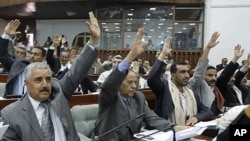Yemen's parliament has formally approved a law giving President Ali Abdullah Saleh immunity from prosecution that paves the way for him to step dwon after more than three decades in power.
The law, made possible through a deal brokered by neighboring Gulf nations, grants Saleh complete immunity from legal and judicial prosecution for any alleged crimes committed during his 33-year rule. The deal, signed by Saleh in November, was aimed at ending months of political turmoil in the country.
The new law also grants a controversial partial immunity to the president's political aides, although last-minute amendments reduced the scope of that amnesty.
Yemeni parliamentarians welcomed the law's passage saying it follows the plan brought forward by the Gulf Cooperation Council (GCC). Parliamentarian Aly Abou Khalifa said the new law will help put the country on the road to recovery.
"This law is an opportunity for national reconciliation and so that the youth can carry out their protests in a safer environment."
The immunity deal has sparked an outcry by pro-democracy activists who have driven the nearly year-long revolution. They are calling for the president to stand trial for a violent crackdown on anti-government protests in which hundreds of people died.
Yemeni activist Abdo Al Rashidy wants to reverse the legislation.
"We have to work to bring down this law. I will go to the highest court in order to reject this law which is full of mistakes."
Human Rights Watch criticized passage of the law. It said in a statement the law "sends the disgraceful message that there is no consequence for killing those who express dissent."
Yemeni officials said on Saturday that Saleh is expected to travel to Oman, before going to the United States for medical care.
Earlier this month, a Yemeni official said Saleh had scrapped plans to receive medical treatment in the United States for injuries sustained in a bomb attack on his presidential compound in the Yemeni capital, Sana'a, last June. The United States says is it considering giving the Yemeni president a visa for the trip.
Under the GCC deal, Saleh has handed authority to Vice President Abed Rabbo Mansour Hadi. Hadi is the consensus candidate of major parties in a presidential election scheduled for February.
Some information for this report was provided by AP, AFP and Reuters.
| Join the conversation on our social journalism site - Middle East Voices. Follow our Middle East reports on Twitter and discuss them on our Facebook page. |




